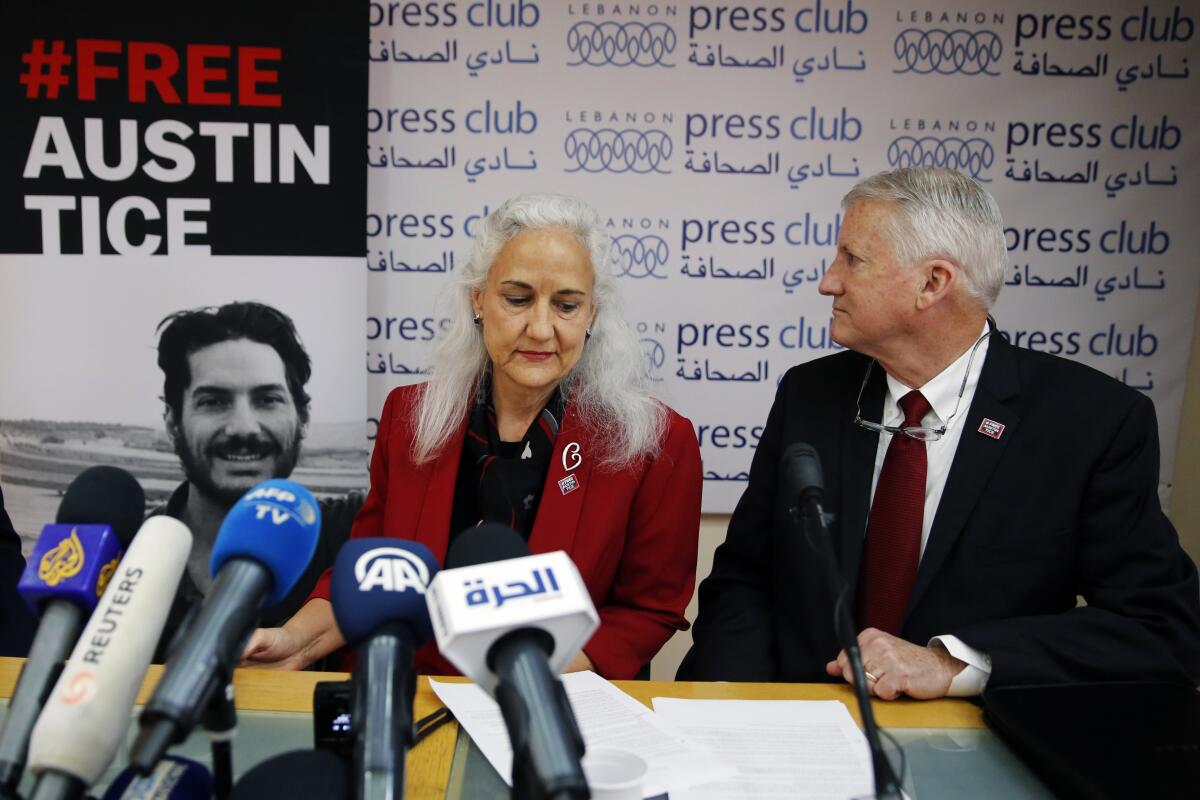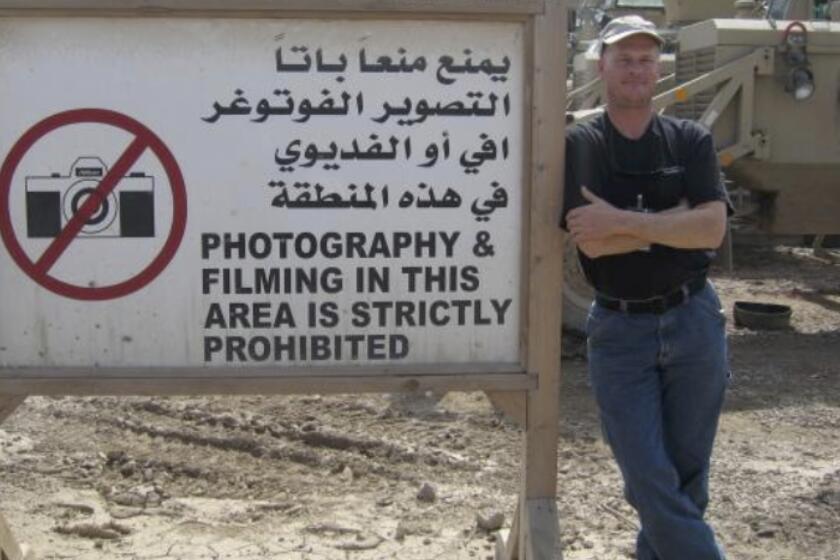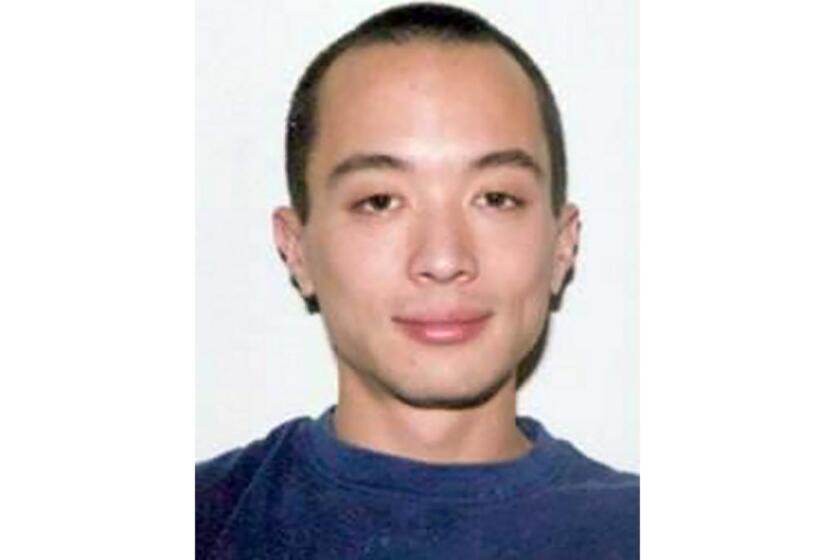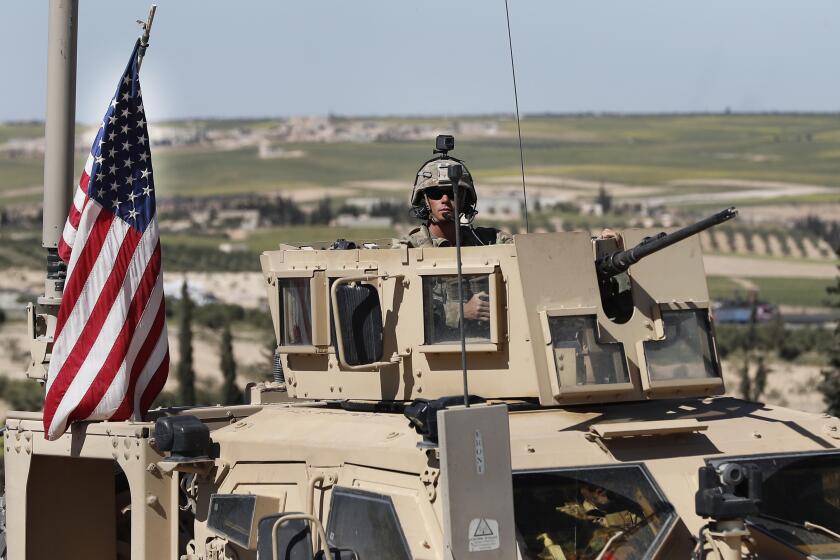Inside the secret talks with Syria aimed at freeing American hostages

Last summer, two U.S. officials ventured into hostile territory for a secret high-stakes meeting with American adversaries.
The Syrian government officials they were scheduled to meet in Damascus, Syria’s capital, seemed ready to discuss the fate of U.S. hostages believed to be held in their country, including Austin Tice, a journalist captured eight years earlier. The release of the Americans would have been a boon to then-President Trump months ahead of the presidential election, and a breakthrough seemed possible.
Yet the trip was ultimately fruitless, with the Syrians raising a series of demands that would have fundamentally reshaped Washington’s policy toward Damascus, including the removal of sanctions, the withdrawal of troops from the country and the restoration of normal diplomatic ties. Equally as problematic for the American negotiators: Syrian officials offered no meaningful information on the fate and whereabouts of Tice and others.
“Success would have been bringing the Americans home, and we never got there,” Kash Patel, who attended the meeting as a senior White House aide, said in his first public comments about the effort.
The Trump White House acknowledged the meeting in October, but said little about it. New details have emerged in interviews that the Associated Press conducted in recent weeks with people familiar with the talks, some of whom spoke on condition of anonymity because of the sensitivity of the matter.
The AP has also learned about U.S. attempts to build goodwill with Syria well before the talks took place, with Patel describing how an unidentified U.S. ally in the region offered assistance with cancer treatment for the wife of Syrian President Bashar Assad.
Family and other supporters of an American contractor abducted a year ago in Afghanistan are pressing the Biden administration to bring him home.
The details shed light on the sensitive and often secretive efforts to free hostages held by U.S. adversaries, a process that yielded high-profile successes for Trump but also dead ends. It’s unclear how aggressively the new Biden administration will advance the efforts to free Tice and other Americans held around the world, particularly if demands at a negotiating table clash with the White House’s broader foreign policy goals.
The August meeting in Damascus represented the highest-level talks in years between the U.S. and the Assad regime. It was extraordinary given the two countries’ adversarial relationship and because the Syrian government has never acknowledged holding Tice or knowing anything about his whereabouts.
Yet the moment offered some promise. Trump had already shown a willingness to withdraw U.S. troops from Syria and elsewhere in the Middle East. And he had made hostage recovery a top foreign policy priority, celebrating releases by inviting freed detainees to the White House.
Months after the Damascus talks, as Tice’s name resurfaced in the news, Trump sent a note to Tice’s parents, who live in Houston, saying he “would never stop” working for their son’s release, his mother, Debra, told the AP.
But Tice’s fate was unknown when Trump left office Jan. 20 and remains so to this day. The former Marine had reported for the Washington Post, McClatchy newspapers, CBS and other outlets.
The Syrian government has released an American citizen who was captured and detained after entering the war-wracked country about four years ago, the State Department said Friday.
The Biden administration, too, has pledged to make hostage recovery a priority. But it has also called out the Syrian government for human rights abuses and seems unlikely to be more receptive to the conditions Damascus insisted on last summer just to keep the dialogue going.
Tice has occupied a prominent spot in the public and political consciousness since disappearing in August 2012 at a checkpoint in a contested area west of Damascus. He had ventured deep into the country at a time when other reporters had decided it was too dangerous, disappearing soon before he was to leave.
A video released weeks later showed him blindfolded and held by armed men and saying, “Oh, Jesus.” He has not been heard from since. U.S. authorities operate under the assumption he’s alive. Syria has never acknowledged holding him.
Efforts to secure his release have been complicated by a lack of diplomatic relations and the conflict in Syria, where the U.S. maintains about 900 troops in the eastern part of the country in an effort to prevent the Islamic State group’s resurgence.
“My assumption is he’s alive and he’s waiting for me to come and get him,” said Roger Carstens, a former Army Special Forces officer who attended the meeting with Patel in his capacity as U.S. special presidential envoy for hostage affairs under Trump. He was kept in the position by Biden.
Just 900 U.S. troops remain in Syria, working with allies in a nation torn by civil war. The Biden administration appears in no rush to leave, fearing an Islamic State resurgence.
At the time of the meeting, Patel was senior counter-terrorism advisor at the White House after serving as a House Intelligence Committee aide, where he gained some notoriety for advancing Republican efforts to challenge the investigation into Russian interference into the 2016 election. He was previously a Justice Department prosecutor under President Obama.
The meeting was more than a year in the making, Patel said, requiring him to seek help in Lebanon, which still has ties with Syria.
At one point, a U.S. “ally in the region” also helped build goodwill with the Syrian government by providing assistance with cancer treatment for Assad’s wife, he said, declining to provide further details. The Syrian government announced a year before the meeting that she had recovered from breast cancer.
The men arrived as part of an intentionally small delegation, driving through Damascus and seeing no obvious signs of the conflict that has killed around a half million people and displaced half of Syria’s prewar population of 23 million over 10 years.
Inside an office of Ali Mamlouk, the head of the Syrian intelligence agency, they asked for information about Tice as well as Majd Kamalmaz, a psychologist from Virginia who vanished in 2017, and several others.
Start your day right
Sign up for Essential California for the L.A. Times biggest news, features and recommendations in your inbox six days a week.
You may occasionally receive promotional content from the Los Angeles Times.
Hostage talks are challenging by nature, with negotiators facing demands that may seem unreasonable or at odds with U.S. foreign policy or that may produce nothing even if satisfied.
In this instance, the conditions floated by the Syrians, described by multiple people, would have required the U.S. to overhaul virtually its entire Syria policy.
The U.S. shuttered its embassy in Damascus in 2012 and withdrew its ambassador as Syria’s civil war worsened. Though Trump in 2019 announced the withdrawal of troops from northern Syria, a military presence remains to help protect an opposition enclave in the northeast, an area that includes oil and natural gas resources.
With their demands unmet, the Syrians offered no meaningful information on Tice, including proof of life, that could have generated significant momentum, Patel said. Although he said he was optimistic after a “legitimate diplomatic engagement,” he looks back with regret.
“I would say it’s probably one of my biggest failures under the Trump administration, not getting Austin back,” Patel said.
The outcome of the diplomacy was deflating for Tice’s parents, though they said it showed that engagement with Damascus was possible.
“And it’s possible to have that dialogue without the United States national security being threatened, without our Middle East policy being impacted, without all the horrible things we were told over the years might happen if the United States actually recognized that there was a government in Damascus,” Tice’s father, Marc, said in an interview.
On Nov. 13, 1970, Hafez Assad, a young career air force officer, took power in Syria in a bloodless coup, the latest in a succession of military takeovers since independence from France in 1946.
In a statement, the State Department said bringing home hostages is one of the Biden administration’s highest priorities and called on Syria to free them. But prospects for talks are uncertain, especially without a more substantial commitment from Damascus. It’s unlikely that the administration sees the Syrians, called out in December by the global chemical watchdog for failing to declare a chemical weapons facility, as credible negotiating partners.
Biden has said little about Syria, though he included it among international problems that the U.N. Security Council should address. In February, he authorized airstrikes against Iranian-backed militias in Syria. Secretary of State Antony Blinken said last week that the situation in Syria is as grave as ever.
In November, after a journalist erroneously tweeted that Tice had been released, his mother wrote a note to be delivered to Trump saying she hoped he could one day make that news a reality.
Trump responded, photocopying her note and adding his own Sharpie-written message. “Debra,” he wrote, she recalled. “Working so hard on this. Looking for the answer. We want Austin back. I will never stop.”
But she said the family does not need letters from the president.
“The thing that is wanted here, the thing we are asking here, is to see Austin on the tarmac, and to have the president of the United States shake his hand,” she said.
More to Read
Sign up for Essential California
The most important California stories and recommendations in your inbox every morning.
You may occasionally receive promotional content from the Los Angeles Times.














